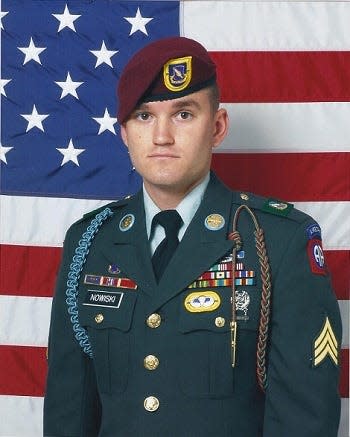Linden mom: My son’s story shows that veterans in NC’s coverage gap need help
My son Aaron fought for America during two tours of duty in Iraq, but when he returned home and needed help, he found himself ignored and overlooked. He died at the age of 24 in 2011, not in combat, but looking for support to free himself of addiction.
Like many North Carolinians, Aaron self-medicated, treating his PTSD symptoms with opioids. And, tragically, like many veterans, his health insurance situation was at best a patchwork, at worst a lethal mess.
More: NC must take care of its veterans — call to pass the toxic exposure act
Legislative leaders can now take a significant step toward ending this cycle by expanding Medicaid, just as 38 states have already done. In doing so, legislators will come to the aid of thousands of North Carolina vets.

Aaron’s fatal predicament was likely exacerbated by being caught in our state’s health care coverage gap. The “gap” refers to people who earn too much to qualify for Medicaid, but not enough to get help in the private insurance marketplace.
More: North Carolinians: Make a Warrior Call to help military and vets
Before the pandemic, approximately 400,000 North Carolinians lacked access to affordable health insurance. Now, The Kaiser Family Foundation estimates the number of North Carolinians who would benefit from closing the coverage gap has grown by over 200,000.
These are small business owners, child care providers and service workers. They are parents raising small children. They are our farmers and frontline workers. And they include thousands of our vets as well as an additional 23,000 uninsured military spouses and children.
More: North Carolina can do more to support military spouses, families
Yes, the U.S. Department of Veterans Affairs tries hard to support our vets, but it is not getting the whole job done. Only an estimated 40% of all veterans are enrolled in the VA system. Eligibility for VA care is dependent on service duration, discharge and disability, leaving many veterans uninsured and unable to get the care they need, even after fulfilling their military commitment.
States that have closed their health care coverage gap under the Affordable Care Act have lower rates of uninsured veterans than those states that did not close the gap.
Closing the gap will also do much to help those in the grip of North Carolina’s opioid crisis, which has only gotten worse during the pandemic.
America saw a steady increase in reported overdoses each month as the pandemic settled in. In NC, we have seen an increase in emergency room visits due to overdose.
Indeed, the pandemic exacerbated the epidemic. It cut off those who need help from supportive resources and from jobs. Most recovery houses are self-supporting which means every resident must be employed to be able to contribute. Job losses due to the pandemic have created a strain on many recovery houses.
Huge savings: $1 for 6 months
Subscribe today to support local journalism and enjoy unlimited digital access including videos, apps, sports news, and more. Special introductory offer for new subscribers only.
But treatment falls away or becomes impossible when people don’t have insurance. Again, closing the coverage gap would help thousands get the treatment they need.
My son earned the Army Commendation Medal. He was caring and courageous. But he was not a match for our nation’s staggering challenges with health insurance. For Aaron, for other vets, for those struggling with addiction, for mourning mothers like me and for so many more, I urge the NC General Assembly to close the coverage gap now.
Terry Nowiski lives in Linden, NC, where she and her husband founded Aaron's Hope, a home where teens in need can find hope and healing through academic, emotional, physical, and spiritual development.
This article originally appeared on The Fayetteville Observer: Linden mom: My son’s story shows that veterans in NC’s coverage gap need help
